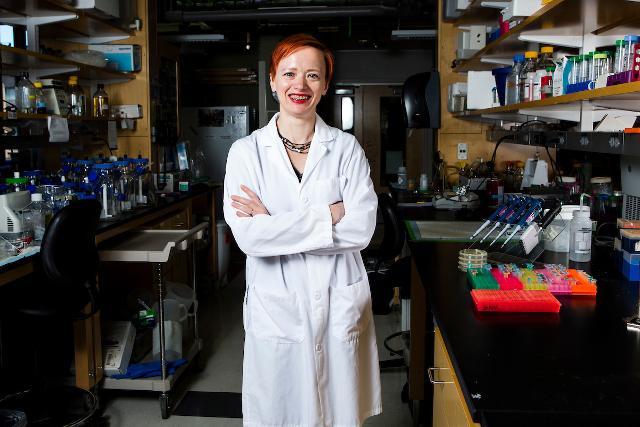-
About
- Departments & Offices
-
Academics
- Public Health
- Biomedical Sciences
- Physician Assistant
- Special Master’s (MBS)
-
Admissions & Financial Aid
- Tuition & Fees
-
Student Experience
-
- Student Resources by Program
- Academic & Student Support
- Wellness & Wellbeing
- Student Life
- Events & Traditions
-
-
Research
- Research Labs & Centers
- Tufts University-Tufts Medicine Research Enterprise
-
Local & Global Engagement
- Global Health Programs
- Community Engagement
School of Medicine Faculty Named to Endowed Professorships
Ekaterina “Katya” Heldwein is the American Cancer Society (Massachusetts Division) Professor of Molecular Biology and Rachel J. Buchsbaum is the Jane F. Desforges, M.D., Chair of Hematology and Oncology

Heldwein’s lab has also made major contributions in deciphering the structural basis for how herpes viruses control their movement in nerve cells by collaborating with biologist Greg Smith at Northwestern University to identify a viral factor responsible for nerve invasion. That work led to a patent that covers the use of this technology in herpes virus vaccination and oncolytic vector therapy.
Heldwein joined Tufts in 2006 as assistant professor of molecular biology and microbiology. She has been a lecturer and course director of the Sackler School’s Animal Virology course, a lecturer to medical students in medical microbiology / infectious diseases, and a lecturer and director of the Dental Infectious Disease course. She was named Outstanding Lecturer at the medical school and received the Dean’s Award for Excellence in Basic Science Teaching from the dental school. Heldwein is also an editorial board member of Virology and the Journal of Virology, and a regular member of the VIRA (Virology A) Study Section at NIH.
Buchsbaum, who has a medical degree from Cornell University, completed a fellowship in hematology and oncology at New England Medical Center, where she trained under Jane Desforges. She was an instructor in medicine at Harvard Medical School from 1986 to 1988, and a clinical fellow in medicine at Tufts School of Medicine from 1988 to 1992, during her postdoctoral training.
Since arriving as a lecturer in medicine at the School of Medicine in 1992, Buchsbaum has served at Tufts Medical Center and Tufts School of Medicine in multiple research and teaching roles. She established her laboratory within the Molecular Oncology Research Institute at Tufts Medical Center to investigate molecular pathways involved in cancer cell metastasis. Her research has focused on the interactions between the breast cancer microenvironment and cancer aggressiveness.
Buchsbaum also is a leading educator with extensive teaching experience. She has directed the School of Medicine’s pre-clinical Hematology-Oncology course since 2006. She has also directed the Hematology/Oncology Fellowship program at Tufts Medical Center since 2005. Under her leadership, sixty-three fellows have graduated to successful careers in hematology-oncology, including twenty-nine pursuing academic track careers. In 2015, she received Tufts’ Milton O. and Natalie V. Zucker Clinical Teaching Prize for Innovation in Medical Education.
She has been closely involved in numerous university committees as well as student and trainee research committees at all levels, and is an active member of several professional societies, including the American Association for Cancer Research, the American Society of Clinical Oncology, and the Alliance for Academic Internal Medicine.
This article originally appeared on Tufts Now.
Department:
Molecular Biology and Microbiology